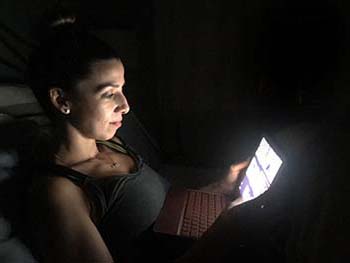Learn about brain health and nootropics to boost brain function
Is blue light from your cell phone, TV bad for your health?

Overexposure to blue light could be hurting your eyes, sleep cycle
(SACRAMENTO) —
From televisions and smartphones to tablets and gaming systems, most of us are glued to our electronic devices. But is all of that blue light shining from screens harmful to our health? Melissa Barnett, principal optometrist at the UC Davis Eye Center, talks about the effects of blue light and what you can do to reduce the health risk.

What is blue light?
Blue light is part of the visible light spectrum -- what the human eye can see. Vibrating within the 380 to 500 nanometer range, it has the shortest wavelength and highest energy. About one-third of all visible light is considered high-energy visible, or "blue," light. Sunlight is the most significant source of blue light. Artificial sources of blue light include fluorescent light, compact fluorescent light (CFL) bulbs, LEDs, flat screen LED televisions, computer monitors, smart phones and tablet screens.
What are the health benefits of blue light?
Blue light boosts alertness, helps memory and cognitive function, and elevates mood. It regulates the circadian rhythm, the body's natural wake and sleep cycle. Sunlight is also important for the growth and development of the eyes and vision in children. Inadequate exposure to blue light can also contribute to the recent increase in myopia, or nearsightedness.
Is too much exposure to blue light unhealthy?
Blue-light exposure from screens is small compared to the amount of exposure from the sun. However, there is concern about the long-term effects of screen exposure especially with too much screen time and when a screen is too close to the eyes.
How is blue light bad for health?
Since the eye is not good at blocking blue light, nearly all visible blue light passes through the front of the eye (cornea and lens) and reaches the retina, the cells that convert light for the brain to process into images.
Continued exposure to blue light over time could damage retinal cells and cause vision problems such as age-related macular degeneration. It can also contribute to cataracts, eye cancer and growths on the clear covering over the white part of the eye. According to a study funded by the National Eye Institute, children are more vulnerable than adults because their eyes absorb more blue light from digital devices.
Exposure to blue light before bedtime also can disrupt sleep patterns because it affects when our bodies create melatonin.
Does blue light contribute to digital eye strain?
Yes. Short-wavelength, high-energy blue light scatters more easily than other visible light. Because computer screens and digital devices emit a lot of blue light, this unfocused visual "noise" reduces contrast and can contribute to digital eye strain.
People also tend to blink less when using digital devices, which contributes to dry eye and eye strain. Other common signs of eye strain include headaches, blurred vision, and neck and shoulder pain. According to the Vision Council, 27% to 35% of Americans reported experiencing one of these symptoms after using digital devices.
What do blue-light glasses do?
While there are many studies on blue light glasses, there isn’t consensus. They can help protect eyes from eye strain caused by overexposure to blue light. The glasses can also help people fall asleep, stay asleep and have a more restful sleep. Theoretically, commercially available blue light-filtering lenses reduce negative effects by 10.6% to 23.6% without reducing quality. Lenses that block blue light with wavelengths less than 450 nm (blue-violet light) also help by significantly increasing contrast. As a result, computer glasses with yellow-tinted lenses may increase comfort when viewing digital devices for long periods of time.
Do I need blue light glasses?
If you spend a lot of time using digital devices and notice digital eye strain, blue light glasses may be helpful. According to the Vision Council, 80% of American adults use digital devices more than two hours per day. Nearly 67% use two or more devices at the same time, and 59% experience symptoms of digital eye strain. Blue light glasses also may be helpful if you have trouble falling asleep.
How can I reduce the negative effects of blue light?
- Get blue-light filters for your smartphone, tablet and computer screens. The filters prevent much of blue light from these devices from reaching the eyes without affecting the visibility of the display.
- Follow the 20-20-20 rule to reduce digital eye strain. Take a 20-second break to view something 20 feet away every 20 minutes.
- Control lighting and glare on the device screen, set up a good working distance and posture for screen viewing. Be sure that even minor vision problems are properly corrected.
- Talk with your eye specialist about blue light protection and digital device use at your next eye examination.
Click here to view full article